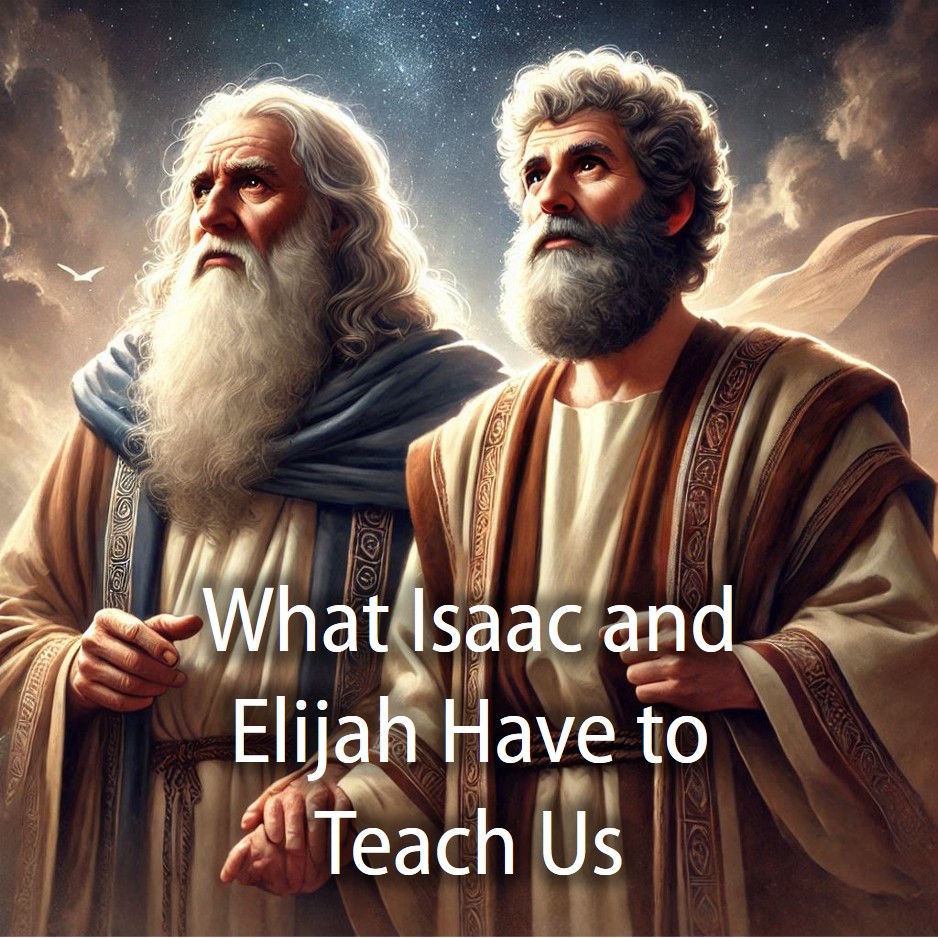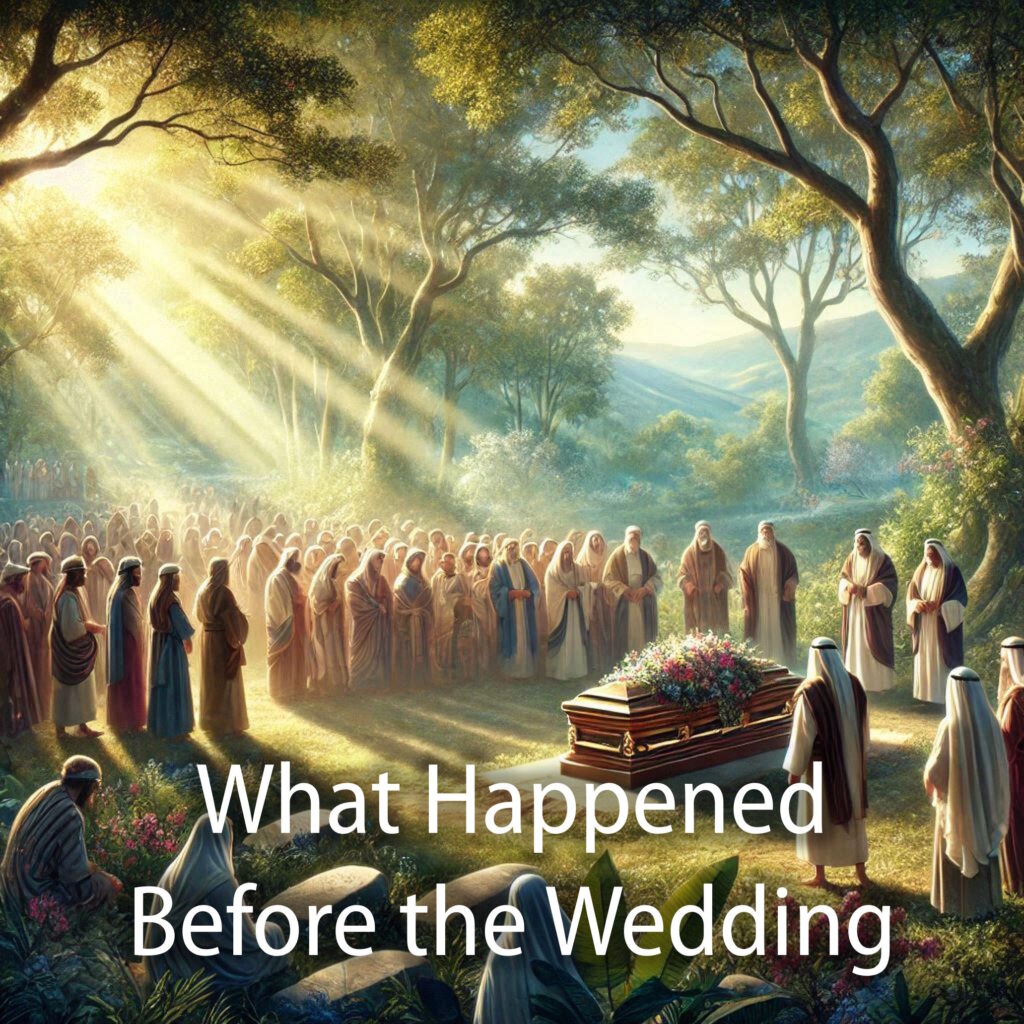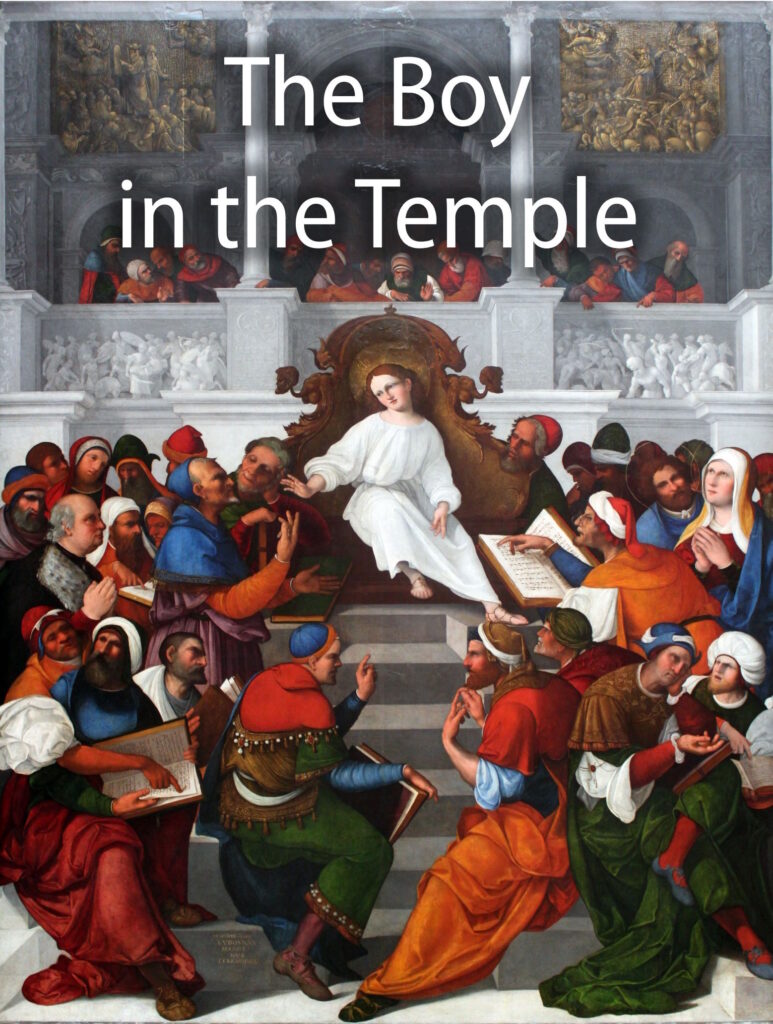Hespeler, 12 January 2025 © Scott McAndless – Baptism
Genesis 26:17-33, 1 Kings 18:41-46, Psalm 107:31-43
If you have been around this church for a while, you know that we try to make a baptism service very special. And it has been my practice, whenever we baptize, to make sure that the entire service is all about that – especially the sermon. I’ve always been able to find some Bible passage to preach on the helps us to reflect on the person who has been baptised and on their family.
And I am particularly blessed today, aren’t I? Not only did Lindsay and David bring us two children to baptize, but both of them (like their older brother before them) have very biblical names. This is going to be easy, right? All I have to do is find a Bible story about Isaac and another Bible story about Elijah and find some way to tie them together with baptism. Nothing could be easier, right?
June of 2019
Isaac was born in June of 2019. And I think we all know what that means, don’t we? It means that, when he was only about nine months old, just when he was getting old enough to come out of his immediate family and join the world, the world said no. The world said, “Isaac, we are kind of afraid of you coming out here to meet us because either you might get very sick, or you might help to spread the virus that will get other people very sick.”
The world told Isaac that it was sure that he was very nice and a very cute baby but it would just be safer if it waited to get to know him for a couple of weeks… or a few more weeks… or a couple of months… you know, let’s make it a few years just to be very safe.
And the good news is that Isaac was safe and healthy and grew to be a strong young boy. The less good news is that he missed out on a lot of those early socialization opportunities that previous generations just took for granted.
Digging Wells

In our reading this morning from the Book of Genesis, we find the patriarch Isaac struggling to find his place in the world. Isaac was the son of a famous nomad named Abraham. Nomads, wanderers that they are, are people who sometimes struggle to fit in the settled world. And so, in our reading this morning, we see Isaac traveling from place to place. Everywhere he goes he tries to establish himself. He does that by digging a well.
Water is a rare and precious commodity in that part of the world. It doesn’t rain much and the riverbeds, called wadis, are often dry. But a well, if you can dig one, gives you an anchor – a place where you continually return to find the one thing you cannot live without.
So, as we read this morning, Isaac started to try and dig wells. He went to this place and dug a well but the people there quarreled with him and so he went to another place and dug again. But the same scenario happened all over again.
This pattern is repeated five times in our reading. And I think that makes Isaac a perfect poster boy for the kinds of challenges we have lived through since 2020. We’ve all been trying to find our place in this world that we don’t quite recognize anymore and things just kept happening that meant that it didn’t quite work.
Isaac and Abilmelech
But, of course, Isaac’s story does have a happy ending and that is what we want to focus on today. At some point Abimelech, King of Gerar, catches up with him. And that seems at first like it is not going to go well. It is a long story, but the last time Isaac and Abimelech met, it ended in a really bad argument. And so Isaac says, “Why have you come to me, seeing that you hate me and have sent me away from you?”
But then something amazing happens. The old enemies decide to put aside their differences. Abimelech recognizes that, even if Isaac has had troubles, his God, Yahweh the God of Israel, has been with him to bless him. And so, Isaac and Abimelech decide to make oaths. They promise each other mutual care and support in the ups and downs of life.
Beer-Sheeba
And while they are celebrating this, Isaac’s servants come up. “Master!” they cry, “you know that well we’ve been digging for you? We finally struck water and it is pure and clean and abundant. God has blessed you.” And so Isaac joyfully names this new well, this new source that will make a home for him, Beer-Sheeba, which means the well of promise.
David and Lindsay brought their family here to St. Andrew’s Hespeler late last year. We have been greatly blessed by their presence and their enthusiasm. They came to us because they were looking for a spiritual home, a place where they could belong after all of the disruption and wandering of pandemic years.
Our Well of Promises
And today they have brought Isaac here to Beer-Sheeba, the well of promises. Here have they made promises to be part of the life of this congregation and to make a place for their children in it. And we have promised too. We have promised to give them a supportive environment in which to raise their children with a good grounding in the Christian faith. All that has been sealed by the water in this well.
I don’t think we’ve yet come to terms with how the experience of a pandemic has wounded our society. We seem to be in a place of great division and polarization that is very hard to overcome. But thanks today to Isaac, who has bought us to the waters of Beer-Sheba. Here conflict can be put aside in the shadow of binding promises made in love. And that is what baptism means.
Elijah
The kingdom of Israel had seen no rain for a very long time. Everyone was struggling. Everyone was living on the edge. But our second Old Testament reading this morning tells the story of how, once three years of drought had passed, Elijah appeared and brought the people rain and hope.
And there is a message in that for us today as we celebrate the baptism of Elijah. You see, after three years of pandemic had gone by, after we had all gotten used to a very different reality where we had to get by with less social interaction and an impoverished society, Elijah came into the world. He was born in October of 2022 in the third year of the pandemic.
A Lesson from Elijah
And so I would like to think that there is a lesson for us in the story of Elijah and how he brought the rain. Maybe it is a message that is particularly timely for where we are as a church at this moment.
The pandemic years have been a very hard time for churches and for other institutions as well. The statistics say that, through the shutdowns and the other measures, a whole lot of people just disappeared from our congregations. It varies from church to church and denominations to denomination, but across the board churches have found their congregations to be smaller, often with a quarter or a third of the people missing. To say that the church has been living through a drought might well be a good metaphor.
Elijah’s Dedication
And because of that, I think we can learn a great deal from Elijah. “Elijah went up to the top of [Mount] Carmel; there he bowed himself down upon the earth and put his face between his knees.” That is, of course, an indication of his dedication. He is praying to God for an end of the drought but this is more than just sending a few words God’s way and hoping for the best. He is putting his whole body, his whole self into it. He goes into a position that, if I tried to demonstrate it to you, I might not just be able to get back up off the ground so I’m not going to try.
This is a reminder that, if we are going to pray for the revival of the church in our times, we need to be all in. It is praying and doing. It is all of us stepping forward whenever we have something to contribute. This is not a time for half-hearted prayer or effort.
But there is something else about how Elijah prays that is much more important for our moment. He prays with incredible patience.
Elijah’s Patience
“He said to his servant, ‘Go up now, look toward the sea.’ He went up and looked and said, ‘There is nothing.’ Then he said, ‘Go again seven times.’”
This is precisely where we often fail in our Christian lives. We ask for something. We try something a little bit different. And then we ask the servant to go out and look towards the sea. When the word comes back that nothing has changed, that everything is just the way it was, what do we do then? We just quit. Oh well, I guess it’s not going to work.
I did get that kind of reaction from a few people when we went through our journey together with Cathy Stewart a couple of years ago. We did some really good work. We listened for what God was saying to us. We introduced some really good new things. We prayed and worked for change. But, as we came to the end of that year-long process, let me tell you that there were some people who got up and looked out to sea. And when they didn’t see attendance levels suddenly restored, when they didn’t see people knocking down our doors, they were ready to give up. Some did.
But Elijah didn’t. When the word came back that there was nothing on the horizon, Elijah went back to work. And he sent the servant again, and again, and again. Six times there was absolutely no sign that anything had changed. Elijah kept on going. And then what appears when the servant goes back a seventh time? All he sees is “a little cloud no bigger than a person’s hand… rising out of the sea.”
Hope in the Smallest Signs
And that might not seem like much. In fact, it isn’t much. But a wise and faithful prophet is able to read in even the smallest signs an indication that God is about to do something. And I honestly think that we have seen a few “little clouds no bigger than a person’s hand.” I think that the arrival of this family which we celebrate today is one such sign.
They, and other young ones among us, are a clear sign of new life and new potential. The harmony with which we have been able to pull together our amalgamation is another little cloud. These are not, to be clear, complete game-changers in themselves, but they are signs of possibility and potential that we are in a great position to build upon.
Empowerment
And that brings us to what Elijah does next. After telling the king to hop on his chariot and get home before the roads get flooded out (at which I am sure the king looked at him as if he was crazy) we are told that the hand of the Lord was on Elijah. He girded up his loins (wrapped his robes up around his legs for free movement) and then outran the king in his chariot, beating him to the gates of the city.
That is a promise to us too. We have waited on the Lord. We have prayed and endured even when it was hard. And God has sent us the signs – the little clouds on the horizon. Now, as the hand of the Lord comes upon us, he will empower us to run to meet the challenge and the opportunity before us.
So, you see. Isaac and Elijah have not just come to us today to receive the grace of baptism. They have come with their family to bring us messages from God, messages of hope and promise and possibility. They have come to challenge us to gird up our loins to prepare for an exciting future.

